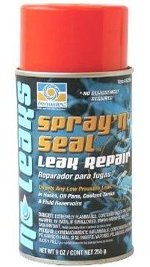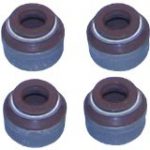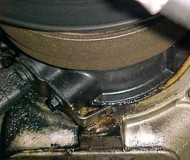Do Stop Leak Products Work

When people ask me if stop leak products work, my answer is probably not but it ultimately depends on the situation. Overall I do not believe in miracle fluids. Even though I’m a nonbeliever there is some scientific stuff in these fluids that could work in the right situation.
Something I feel works a little better than something you can pour on the inside to stop a leak is something that you could spray on the outside to stop this leak. But remember whenever you have a choice between replacing a leaking gasket or using a stop leak solution of any kind the replacement of the gasket or seal is always going to be the better longer lasting auto repair.
The first time I used spray and seal from Permatex (available below along with a few other popular stop leak products) was for an oil leak on my 2004 Chevy Blazer. I have discussed this particular leak in depth and you can read that article on my page about Chevrolet oil leaks. To make a long story short the leak was at the front timing cover where it met the oil pan.
I used the Permatex spray and seal to help save my driveway until I had time to perform this major repair on my blazer. Being familiar with this type product I knew that the most important part about it being successful was cleaning the surface. Obviously nothing will stick to engine oil. The more of it you can remove the better of a chance you have that the spray and seal will work. In my case the timing cover leak was completely sealed (short term) however it did start to leak about three months down the road.
The Science of Stop Leak Products

As far as engine, transmission and power steering stop leak products often the main ingredient is some kind of petroleum distillate. The idea is that this chemical will soften a hardened rubber seal. Say what you will about these miracle fluids but the theory behind the operation in my opinion is a sound one, it’s the results we have to question.
As a rubber seal begins to dry out it also shrinks and pulls away from the sealing surface. The idea behind the petroleum distillate additives is to soften the rubber seal and help it re-expand back to its original dimensions. This can theoretically work but there is a few underlying problems with this.
If the engine oil seal for example is very old there is a chance that the petroleum distillate will soften the seal but will also disintegrate it. In this scenario it can actually make the fluid leak worse. On the other hand let me give you an example where the stop leak system worked for me. I had a Four Winns boat with a 4.3 L Chevrolet engine installed. On its eighth birthday it began leaking power steering fluid from the front pump shaft seal. The leak started out as a very small one.
But when it comes to the power steering system on the Merc cruiser it also has a small reservoir so it does not hold a lot of fluid. I knew that replacing the power steering pump was coming down the road but I decided to try and slow this down by installing the Lucas brand power steering stop leak. Now keep in mind that my situation was ideal to use this product. The leaking shaft seal was not that old and was only leaking slightly. I got about another two years out of that power steering pump before I had to replace it.

Although I can cite a few cases where I did see some type of miracle fluid perform as advertised I have many more stories where it did not work at all. When I worked for an auction company they loved using miracle fluids of any kind. If an engine had a smoking condition they asked me to dump in some stop smoke. If a transmission was slipping or leaking they would ask me to throw in some transmission in a bottle.
If you have broken metal parts inside the transmission there is no fluid that I know of that you can add that is going to fix the problem. This is why I always stress that if you want to try a stop leak type product go ahead. But don’t be disappointed if it doesn’t work or makes the situation worse. Although most people understand there is no harm in trying if you know the likely results.
Oil and Fluid Leaks on Old Cars
In my opinion the older the vehicle the less chance you have of a miracle fluid providing any assistance. This is one of those Catch-22’s where a stop leak product will work better on a new vehicle that is not leaking at all. Sure Older cars from the 80s and 90s where job security for mechanics like me. The auto manufacturers can be slow at adapting to problems with gaskets O-rings and sealing surfaces.

The best car I ever owned was a 1979 Pontiac Trans Am. I have a picture of the anniversary edition to the right. Although this was my favorite car it made a mess out of my parent’s driveway. The oil pan and valve covers were sealed with very thin cork gaskets.
Most stop leak products containing petroleum distillates won’t help a cork gasket leak. You can get rubberized replacement gaskets from aftermarket companies. I still hear about the driveway from my parents despite cleaning it with Oil eater (available above).
As far as the more modern automobiles from 2000 and newer, oil leaks are just not as common today as they where years ago. This is because the manufacturers have improved not only the gaskets but the sealing surfaces that they push against to seal in fluids. This is largely in part to better casting procedures and computerized manufacturing equipment that is capable of much straighter and longer surfaces. This does not mean that you will never have an oil leak on this type of vehicle.
As I mentioned before you can take a look at my blazer article linked from above. But to make a long story short what happened was they changed the stamped metal timing cover to a plastic part that warped from heat and leaked oil heavy. If you would like to read more of my insightful automotive articles this next link will take you back to the automotive repair blog home page. If I could talk you into learning more about my favorite car of all time this next link will take you to a story about my 1979 Pontiac Trans Am.

